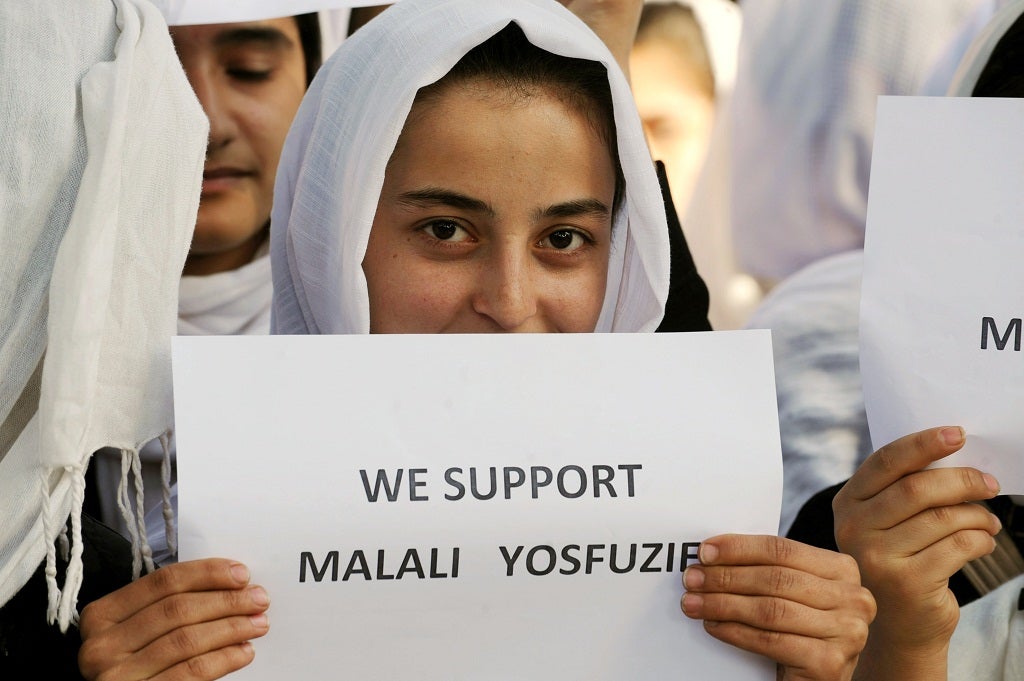The Independent's journalism is supported by our readers. When you purchase through links on our site, we may earn commission.
It's not just Taliban bullets that hold back girls' education. Whole governments are at it
Zimbabwe spent $35million on defence this year - and just $5million on education

In a piece for the BBC this week, Gordon Brown called for a “day of action” for Malala and girls’ rights to school.
Brown - who is now the UN’s Special Envoy for Global Education - admits in his article that the world has been misled by various governments and NGOs into believing that progress is being made towards universal education, when in fact 61 million children aren’t receiving an education and 200 million more remain illiterate despite attending school.
As she lies on her hospital bed in Birmingham, Malala Yousafzai must be pleased to learn that her voice is finally being heard.
One of Brown’s proposed measures is that November 10th be declared “Malala and the 32 girls day”, in hope that “we can start to make Malala’s dream come true.”
I support such a move and believe that Malala’s selfless service to others should be honoured. But I’m just not convinced that the concrete problems faced by Malala and other children across the world can meaningfully addressed by setting aside a date on a calendar.
In many countries, government policies on education are holding back progress in much the same way as Taliban bullets – and few are speaking out.
In this year’s national budget the Zimbabwean Minister of Finance, Tendai Biti (a darling of the West) allocated $35 million for the army (though Zimbabwe is not at war), over $10 million for foreign trips by government ministers and their wives, and only $5 million for education.
In fact, earlier this year the Zimbabwean MDC-ZANU coalition government diverted $90,000 from the education budget to bail out the country’s football association, ZIFA, to pay for hotel bills.
Meanwhile, many Zimbabwean children continue to risk their lives crossing crocodile and snake-infested landscapes to get to South Africa in search of an education. Young girls have been gang raped while making the dangerous journey.
And upon arriving in South Africa they find themselves faced with one of the worst and most dysfunctional state education systems in Africa, in a country regarded as the continent’s wealthiest. South African state education has been plagued by corruption, maladministration, poor teacher training, and an anti-intellectual culture.
The politicians and government officials presiding over collapsing state education systems in countries such as India, Pakistan, Zimbabwe, South Africa, Kenya, and Nigeria are not concerned about providing decent education to their nations’ children - they can afford to send their own to one of the schools in the booming private sector.
Western donor countries that continue to finance such governments are complicit in the educational genocide of poor children across the developing world.
As things stand, poor parents in such countries are often forced to make a very difficult choice between paying for either their son or daughter’s education. In such cases it is always the sister who loses out in favour of her brother.
If we are serious about making “Malala’s dream come true”, we should be prepared to make more than just gestures. We should start by recognising that corrupt politicians and government officials who see it fit to spend more of their countries’ resources on the military and trips abroad than education are just as dangerous as Taliban bullets.
Join our commenting forum
Join thought-provoking conversations, follow other Independent readers and see their replies
Comments
Bookmark popover
Removed from bookmarks